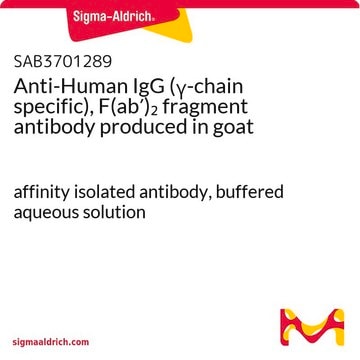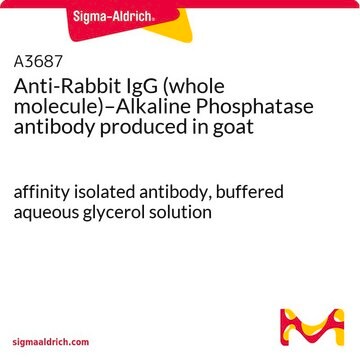Fontos dokumentumok
I9885
Anti-Human IgG (γ-chain specific), F(ab′)2 fragment antibody produced in goat
affinity isolated antibody, lyophilized powder
Szinonimák:
Goat Anti-Human IgG
About This Item
Javasolt termékek
biológiai forrás
goat
Minőségi szint
konjugátum
unconjugated
antitest forma
affinity isolated antibody
antitest terméktípus
secondary antibodies
klón
polyclonal
Forma
lyophilized powder
kiszerelés
pkg of 5x1 mg
pkg of 1 mg
tárolási körülmény
avoid repeated freeze/thaw cycles
technika/technikák
Ouchterlony double diffusion: suitable
quantitative precipitin assay: suitable
szín
white to off-white
oldhatóság
water: soluble, clear to hazy, colorless (after reconstitution with 1 ml of 0.135 M NaCl)
tárolási hőmérséklet
2-8°C
célzott transzláció utáni módosítás
unmodified
Általános leírás
Immunogén
Alkalmazás
Fizikai forma
Jogi nyilatkozat
Nem találja a megfelelő terméket?
Próbálja ki a Termékválasztó eszköz. eszközt
Tárolási osztály kódja
11 - Combustible Solids
WGK
WGK 3
Lobbanási pont (F)
Not applicable
Lobbanási pont (C)
Not applicable
Egyéni védőeszköz
Eyeshields, Gloves, type N95 (US)
Válasszon a legfrissebb verziók közül:
Analitikai tanúsítványok (COA)
Nem találja a megfelelő verziót?
Ha egy adott verzióra van szüksége, a tétel- vagy cikkszám alapján rákereshet egy adott tanúsítványra.
Már rendelkezik ezzel a termékkel?
Az Ön által nemrégiben megvásárolt termékekre vonatkozó dokumentumokat a Dokumentumtárban találja.
Tudóscsoportunk valamennyi kutatási területen rendelkezik tapasztalattal, beleértve az élettudományt, az anyagtudományt, a kémiai szintézist, a kromatográfiát, az analitikát és még sok más területet.
Lépjen kapcsolatba a szaktanácsadással








